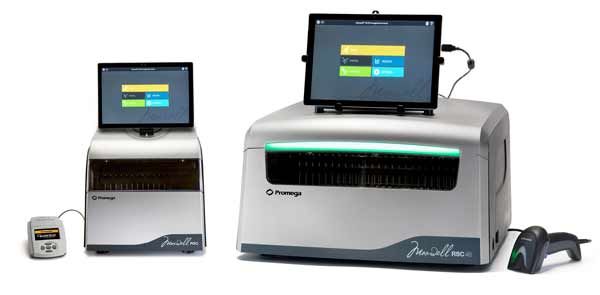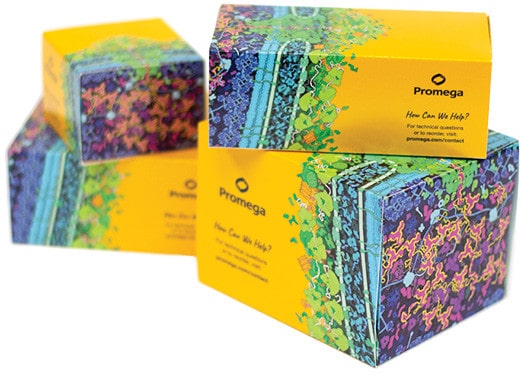Coronavirus SARS-CoV-2 Detection and Assay Development
The emergence of new viral diseases, including the coronavirus SARS-CoV-2 (COVID 19), MERS (2015) and SARS (2003) outbreaks, highlights the need for fast methods to detect and identify target viruses at scale. The COVID-19 pandemic also illustrates how research efforts to develop drug treatments or vaccines are accelerated in times of urgent need. The need for supplies and support for scientists working to curtail spread of the SARS-CoV-2 virus is urgent and immediate.
Promega supports scientists working to understand the molecular mechanisms by which emerging viruses infect humans and animals, and to develop accurate detection methods. We provide collaborative technical support, nucleic acid purification expertise, amplification products and labeling technologies that streamline workflows and expedite the work of research labs studying coronaviruses and other emerging viral diseases.
Amplification Products for Viral Analysis
qPCR and RT-qPCR
PCR reagents, including qPCR and RT-qPCR products are used to detect and amplify target viral sequences.
XpressAmp® Direct Amplification Reagents enable direct PCR without prior RNA or DNA extraction. These reagents are used to prepare viral samples for analysis in qPCR or RT-qPCR assays.
The SARS-CoV-2 RT-qPCR Kit for Wastewater is designed to detect SARS-CoV-2 viral RNA in preprocessed wastewater for population surveillance and epidemiological studies.
PCR Reagents and Accessory Products
GoTaq® Probe qPCR and RT-qPCR Systems
Master mix listas para su uso en qPCR o RT-qPCR basadas en sondas.
A6101, A6102, A6120, A6121, A6110
XpressAmp® Direct Amplification Reagents
Método rápido, sin extracción de ARN que permite preparar muestras virales para la amplificación por PCR.
A8882, A8880
SARS-CoV-2 RT-qPCR Kit para aguas residuales
Detectar ARN de SARS-CoV-2 en aguas residuales preprocesadas con una alta eficacia y sensibilidad.
AM2100, AM2110, AM2120, AM2130, AM2140, AM2070, AM2050, AM2060
Amplification Application Notes
Direct Amplification from Saliva
Viral RNA detection from Saliva using XpressAmp® lysates: GoTaq® Probe 1-Step RT-qPCR System; Luna® Universal Probe One-Step qPCR Kit
Viral RNA detection from Saliva using SalivaDirect™ and GoTaq® Probe 1-Step RT-qPCR System: CFX; 7500
Direct Amplification from Viral Transport Media
Viral RNA from VTM using XpressAmp® lysates: GoTaq® 1-Step RT-qPCR System
References
RT-PCR:
Diagne, M. et al. (2020) Dianke virus: A new mesonivirus species isolated from mosquitoes in Eastern Senegal. Virus Research 275, 2 January 2020, 197802.
Alves, M.T. et al. (2018) Mamastrovirus 5 detected in a crab-eating fox (Cerdocyon thous): Expanding wildlife host range of astroviruses. Comparative Immunology, Microbiology and Infectious Diseases 58, 36-43.
qPCR for Detection of Viral RNA:
Cai, M. et al. (2020) The R251K Substitution in Viral Protein PB2 Increases Viral Replication and Pathogenicity of Eurasian Avian-like H1N1 Swine Influenza Viruses. Viruses 12(1), 52.
Viral Structure and Characterization:
Wicht, O. et al. (2014) Proteolytic Activation of the Porcine Epidemic Diarrhea Coronavirus Spike Fusion Protein by Trypsin in Cell Culture. J. Virol. 88(14), 7952–7961.
Scalable Viral Nucleic Acid Extraction Solutions
Trusted Promega chemistries for viral nucleic acid purification are available in manual and automated formats to accommodate differing sample processing needs.
In addition to Maxwell® Instruments and cartridge-based kits for automated purification of 1-48 samples, Maxwell® HT extraction chemistries are available in plate-based, 96-well formats that can be used with high-throughput liquid-handling robots or performed manually with multichannel pipettors. We also offer a variety of viral manual extraction kits and protocols. These viral nucleic acid extraction chemistries are available to help laboratories developing coronavirus (SARS-CoV-2) tests and researching solutions for the COVID-19 pandemic.
Automated Viral Nucleic Acid Extraction
Maxwell® instruments are used together with Maxwell® Viral Total Nucleic Acid Purification Kits to extract viral nucleic acids from up to 48 samples per run.

Maxwell® Viral Total Nucleic Acid Purification Kits
Maxwell® RSC Viral Total Nucleic Acid Purification Kit
Extracción de ácidos nucleicos totales virales a partir de varios tipos de muestras, utilizando el Maxwell® RSC Instrument.
AS1330, ASB1330
Maxwell® 16 Viral Total Nucleic Acid Purification Kit
Extrae ARN y ADN viral a partir de suero o plasma. Requiere el Maxwell® 16 Instrument.
AS1150
Maxwell® CSC Viral Total Nucleic Acid Purification Kit
Extracción de ácidos nucleicos totales virales a partir de varios tipos de muestras, utilizando los Maxwell® CSC Instruments.
AS1780
Kits de concentración y extracción de ARN/ADN viral para aguas residuales
Reactivos y consumibles para concentrar y purificar ácidos nucleicos totales (TNA) en un práctico kit.
A2991, AS1831, AX9190, A3050, A3070
Maxwell® Instruments
Maxwell® RSC Instrument
Instrumento para la purificación automatizada de ácidos nucleicos, con cuantificación integrada. Sólo para uso en investigación.
AS4500
Maxwell® RSC 48 Instrument
Instrumento para la purificación automatizada de ácidos nucleicos de 1 a 48 muestras. Sólo para uso en investigación.
AS8500
Maxwell® CSC Instrument
Instrumento para la purificación automatizada de ácidos nucleicos a partir de muestras clínicas. Para uso diagnóstico in vitro.
AS6000
Maxwell® CSC 48 Instrument
Instrumento para la purificación automatizada de ácidos nucleicos a partir de muestras clínicas. Para uso diagnóstico in vitro.
AS8000
High-Throughput Automation and Manual Purification Chemistries
ReliaPrep™ Viral TNA Miniprep Kit, Custom
The ReliaPrep™ Viral TNA Miniprep Kit, available as a custom order, uses spin columns for rapid centrifugation-based processing of viral samples. See the Application Notes provided below for example protocols.

Maxwell® HT Viral TNA Kit, Custom
The Maxwell® HT Viral TNA Kit uses magnetic resin for easy automation and separation using robotic liquid handlers. The kit can also be used for manual purification in multiwell plates. For example protocols using the Maxwell® HT Viral TNA Kit on Tecan, Hamilton, Eppendorf and Kingfisher robots, and for example manual purification protocols, please review the Application Notes provided below.
Please contact us for information on pricing and availability.
Purification Scale-Up and Automation Support
Promega Field Support Scientists (FSS) are available to help labs implement or optimize automation of viral RNA extraction methods, regardless of the instrumentation platform used.
If you are new to automation, pressed for time, or need help choosing and adapting a viral nucleic acid purification method, we can help. We provide chemistry and instrumentation expertise and will work with you to configure your instrument and optimize the workflow to meet your laboratory's needs.
Viral RNA Extraction Application Notes
Manual Purification
ReliaPrep™ Viral TNA Miniprep Kit, Custom
Viral RNA from Transport Medium
Maxwell® HT Viral TNA Kit
Viral RNA from Sputum (96-well)
Maxwell® Instrument Purification
Maxwell® RSC Instrument
Viral RNA: CDC 2019-nCoV EUA Extraction Protocol
Viral RNA from Saliva: Oragene-RE-100; Oragene OM-505; Oragene OR-100; MP+ R-2000; Norgen RNA; Spectrum SDNA-1000
RNA from Viral Transport Medium
Viral RNA from Wastewater Concentrate
Maxwell® 16 Instrument
References
Viral RNA Extraction Using Maxwell® 48:
Jaeger, A.S. et al. (2018) Zika viruses of both African and Asian lineages cause fetal harm in a vertical transmission model. PLOS Neglected Tropical Diseases doi: 10.1371/journal. pntd.0007343
Chantal Reusken, C. et al. (2019) Toscana, West Nile, Usutu and tick-borne encephalitis viruses: external quality assessment for molecular detection of emerging neurotropic viruses in Europe, 2017. Euro Surveill. Dec 12; 24(50): 1900051.

We are committed to supporting our customers who are working to help those most affected find solutions.
How to Develop a Viral Assay
Molecular assays using PCR have become the method of choice for viral detection due to their specificity and speed. This article discusses key considerations to take into account during the assay development process, including:
- Guidelines for decisions for extraction, amplification, and detection for assay design
- Links to reference materials, including 2019-COVID primer sequences
- Strategy for future virus detection assay development
“With proper planning and research,
a laboratory can rapidly create a
reproducible method for detection of a
viral target.”
Reporter Technologies for Viral Research
Luciferase Reporters
Luciferase reporters provide a simple and convenient method for monitoring the effect of potential treatments, creating in vitro assays for detecting viral antibodies, and for imaging viruses in animal models. The small size of NanoLuc® Luciferase makes it well suited for the creation of reporter viruses.
Remdesivir (RDV or GS-5734) was used in the treatment of the first case of the SARS-CoV-2 (formerly 2019-nCoV ) in the United States. RDV is not an approved drug in any country but has been requested by a number of agencies worldwide to help combat the SARS-CoV-2 virus. You can read more about use of NanoLuc® Luciferase reporters to support this research here.
References
Evaluation of anti-viral drug candidates:
Zhang, L. et al. (2020) Alpha-ketoamides as broad-spectrum inhibitors of coronavirus and enterovirus replication. Structure-based design, synthesis, and activity assessment. J. Med Chem. DOI: 10.1021/ acs.jmedchem.9b01828. Publication Date (Web): 11 Feb 2020
Sheahan, T.P. et al. (2020) Comparative therapeutic efficacy of remdesivir and combination lopinavir, ritonavir, and interferon beta against MERS-CoV. Nature Communications 11, Article number: 222.
Testing for viral antibodies in serum using viral proteins fused to NanoLuc® luciferase:
Wang, W. et al. (2019) A novel luciferase immunosorbent assay performs better than a commercial enzyme-linked immunosorbent assay to detect MERS-CoV specific IgG in humans and animals. Biosafety and Health 1(3), 134–43.
Monitoring viral distribution by bioluminescence imaging:
Shen, L. et al. (2019) High-Throughput Screening and Identification of Potent Broad-Spectrum Inhibitors of Coronaviruses. DOI: 10.1128/ JVI.00023-19. J. Virol. 93(12), e00023-19.
SARS-CoV-2 Research, Vaccine and Therapeutic Development
Reporter and cell health assays, RT-qPCR, and RNA production systems are widely used by researchers studying key aspects of viral pathogenesis, including characterizing virus:host interactions, tracking viral nucleic acids and proteins in the cell, and monitoring host cell viability and metabolism.
Serology and PCR Testing
Development and implementation of accurate molecular and serological assays is an urgent focus of many laboratories worldwide. Promega provides products and custom services to labs designing, performing and scaling up PCR-based molecular tests, and to support labs performing serological assays and researching new serological testing methods.

Coronavirus SARS-CoV-2 News and Updates
Last updated , Dec 23 2021
The SARS-CoV-2 pandemic presents an ongoing challenge to researchers and public health officials. See below for a regularly updated list of COVID-19 and viral research articles. Information on how Promega manufacturing is responding to our customers needs during this time is available in this article.

COVID-19 Intranasal Vaccines Revisited: Can They Reduce Breakthrough Infections?
Dec 10, 2021

Virus-Like Particles: All the Bark, None of the Bite
Nov 17, 2021

How A New Wastewater Surveillance Method Predicted COVID-19 Cases in Italy
Nov 15, 2021

New Assay to Study SARS-CoV-2 Interaction with Human ACE2 Receptor
Nov 1, 2021

Streamlining Research: The Merits of Adaptive Clinical Trials
Oct 27, 2021

Rare Human Antibody Could Lead to A Universal Coronavirus Vaccine
Oct 18, 2021